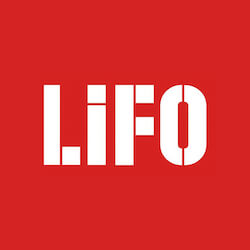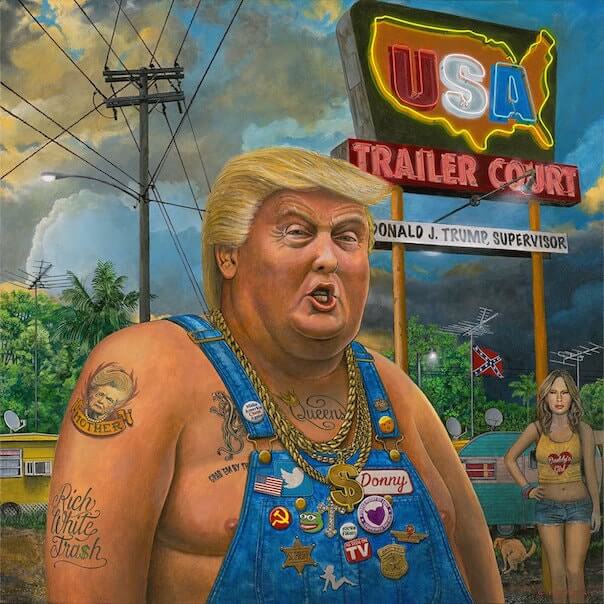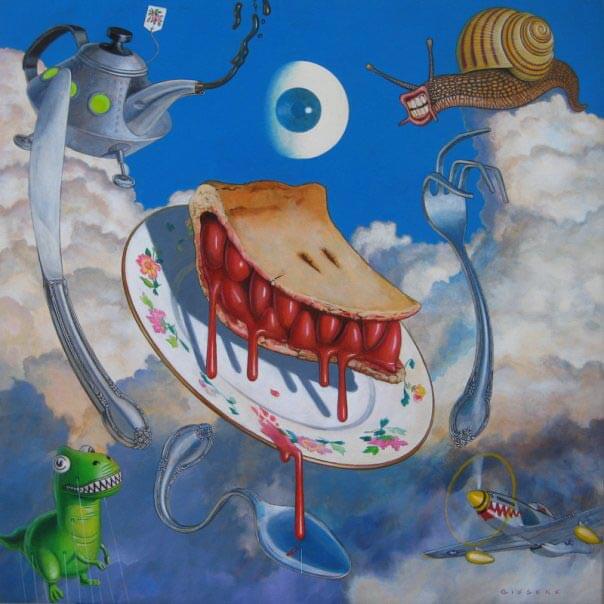
The following is the original English version of an interview for the Greek magazine ‘
Lifo’ by Vaggelhs Makris.
Tell us a little about yourself and your family background.
I was born in December of 1952. I grew up in Overland Park, Kansas, the oldest of three boys. My dad was a meat cutter. My mom was a stay-at-home housewife. I couldn’t think of a better time to have come of age than the 1960’s in America.
Why did you become an artist?
It’s all I really ever wanted to do. I’d heard all my life as a kid that it was a pointless endeavor and that I should give it up for something “more practical”. After I had hit my mid-twenties, all those voices finally shut up for some reason. They ultimately realized I wasn’t going to listen to them anyway.
What are the most vivid memories from your childhood?
I grew up in the suburbs just before rampant development engulfed every bit of green. My best memories are of roaming the woods and fields and exploring the flora and fauna in them. My grandmother lived in a house that was eventually swallowed up by a huge Interstate highway interchange that went in. As kids, my brothers and cousins and I would wander through the fields and creek that were there. I don’t live far from that site today and, every time I drive through it, it breaks my heart to see what’s become of it.
For some reason, I have always been intrigued with the bizarre and surreal. This became apparent early on. Real life wasn’t near as interesting as what I could
imagine it to be. Science and science fiction appealed to me. I was an awful student in school. I would rather be drawing than anything else.

I read that your work 'Trailer Park Nation' is not about Trump. Could you tell us more about this painting?
I came up with the idea for the painting on Election Night, when we all realized Trump was going to win. I wasn’t so much angry that he won as much as I was embarrassed that he won. How could this loathsome excuse for a human being, with no experience in government, politics, or diplomacy slip through the process to become the leader of this country where I grew up? A conman with multiple failed businesses, a reality TV show host, were legitimate qualifications to be president of the United States? I thought, “My goodness. A good half of this nation is apparently made up of ignorant, racist, TV-watching idiots.”
The painting is about the people who voted for him. It’s a bit of a misnomer and I’m guilty of using a bad stereotype. You can still be poor and be a decent person. You can, of course, live in manufactured housing and not be labeled “trash”. I just needed a point of reference that night. Nevertheless, I’ve spoken with several people who live in trailer parks and they get it. They’re OK with the reference and they know the point I’m making. They have a good self-deprecating sense of humor about it.
The ones who are insulted about it are the bourgeois class. The suburbanites. They have money. It pisses them off because I put them squarely in the same cesspool as the skanky, Confederate flag-waving turds who also voted for Trump. They turned a blind eye to all of Trump’s racism, sexism, xenophobia, homophobia and a whole laundry list of disgusting characteristics, with the excuse that he was going to lower their taxes by a few bucks. Honestly, I don’t believe them. I truly believe it was Trump’s demagoguery that secretly resonated with them.
Tell us about the artists who have a strong impact on your art.
I stole from everybody. Ha! I have such a long list of artists who have influenced me. In my formative years as an illustrator, I looked at the work of a bunch of contemporary illustrators. Chief among them were Robert Grossman, Peter Palombi and Charlie White III. However, there were so many others. And then there were the surrealists; Salvador Dali, Gustav Klimt, M.C. Escher and all. At some point, I developed my own style and I didn’t have to borrow from anyone again.
I still look at other artists work, but it’s more out of admiration for their work now, rather than direct inspiration.
Tell us about your experience in the army.
The Vietnam War was still going on when I got a low number in the draft lottery. I decided to enlist for 3 years to pick my occupation, rather than get drafted for two years and most certainly end up as an infantryman in Vietnam. I had no regrets whatsoever about not going to such a stupid war. The idea of killing people who never did me wrong troubled me more than being killed myself. As it turned out, when I finally did go in, the war was basically over.
I enlisted as a welder. I went to Germany. I welded, I drank a lot of very good beer, I got to travel around Europe and see some wonderful things, and I met a girl whom I would later on marry.

I saw "Pie and the Eye in the Sky" work and I suppose that you are a non-religious person. Could you tell us more about it? When did you first realize that God does not exist?
My folks were very religious. My dad came from a devout Missouri Synod Lutheran family. There was no questioning it. They made us go to church and that was that.
At around age 8, I was in the backseat of the car my mom was driving. I asked her, “Mom, what’s heaven like?”
She replied, “Oh, it’s wonderful. The streets are paved with gold and there are apple trees everywhere.”
I turned white as a sheet. I broke into a cold sweat. I imagined burning my bare feet on hot, inappropriate, metal pavement and people doubled over shitting applesauce- for an eternity. I’d always suspected it was nonsense. That was the last straw for me as far as religion went. That notwithstanding, my mom’s gold streets and apple trees made more sense than the bulk of the absurdities and contradictions in the Bible.
All the same, I couldn’t come out and tell them I thought it was horseshit because they put so much stock in it. I would have been punished for my incredulity. Over time, it just made me a better liar that I couldn’t confront them with the truth. In the end, I finally told them when they were in their old age. They were still very upset about it.
I find pretty much nothing appealing about religion. My parents’ brand of religion was strongly based on reward and punishment. After a while, I simply didn’t care about either the reward or the punishment. The god they talked about was predominantly a needy, egotistical, psychotic dickhead, as far as I was concerned.
Sometimes, to make a point, I’ve told believers that I am god. I ask them if they believe me and inevitably the answer is no. Then I ask them, “What would your god have to do to prove it was a/the god?” None of them can ever come up with an answer- not for me, but for themselves.
People need their god to be imaginary. They just haven’t come to terms with this yet. Let’s say, for the sake of argument, there was some all-powerful-entity/creator-of-everything and it could prove that it was and it made itself manifest. People wouldn’t believe it was a god. At that point, it would cease to be a god and become a scientific phenomenon. Half of them would call it a hoax, the other half would dissect it and study it to see what made it tick. Just like the people in earlier days who worshiped the sun and moon and volcanoes and such, once they figured out what those things really were, they lost their gods.
Generally, I don’t care what other people want to believe in. It’s only when they want to inflict their superstitions on everyone else through laws or public policies that I have a problem with, particularly when their silly, tribal beliefs lead them to war.
Tell us about your decision to leave illustration.
I didn’t. Illustration left me. In the summer of 2011, it stopped. I was down to one client at that time. I got a lot of work from that one client, but eventually that came to an abrupt end when the ad agency decided they could save money by having their illustration done in house. I couldn’t find illustration work anywhere. I talked to other illustrators I knew and the majority of them had already hung up their brushes and gone on to other things. Print was dying.
Do you have any advice for the new illustrators?
No.
I’m not being evasive. I really don’t have any advice for them. Everything I used to do won’t work in this day and age. I suspect they’ll figure it out for themselves, whatever that may be. I would say, whatever the future of illustration is, and you find it, don’t get too comfortable with it. If history has taught me anything, it’s that nothing lasts forever.
What is the biggest life lesson you’ve learned in life?
My favorite author is Kurt Vonnegut, Jr. He had a quote that clicks for me: “I tell you, we are here on Earth to fart around, and don’t let anybody tell you different.”
I’m going to paint some pictures, make some things, and, generally, just fart around.
 The following is the original English version of an interview for the Greek magazine ‘Lifo’ by Vaggelhs Makris.
The following is the original English version of an interview for the Greek magazine ‘Lifo’ by Vaggelhs Makris.
